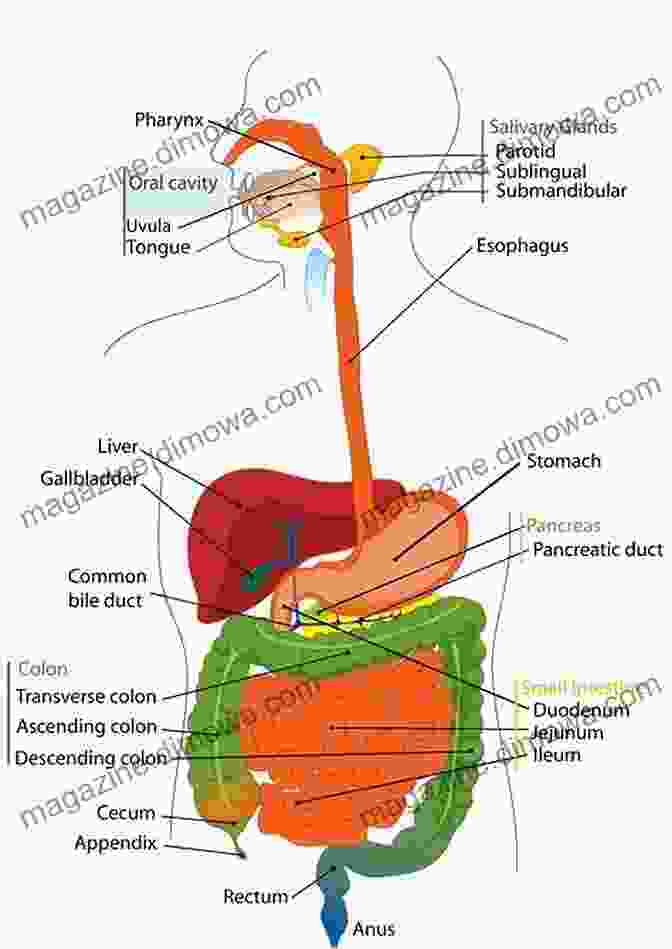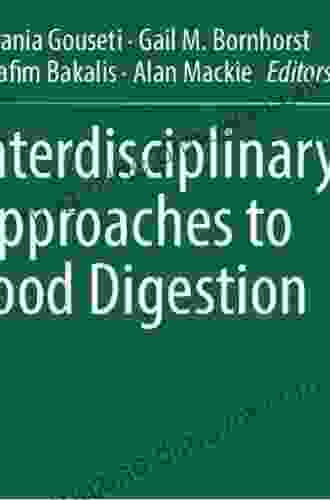Unveiling the Secrets of Food Digestion: An Interdisciplinary Exploration

Food digestion is a complex and fascinating process that involves multiple organs and systems working together to break down food into nutrients that the body can use for energy and growth. This process is essential for maintaining overall health and well-being, and it is influenced by a variety of factors, including diet, lifestyle, and genetics.
In recent years, there has been growing interest in the interdisciplinary study of food digestion. This approach brings together researchers from a variety of fields, including nutrition, physiology, biochemistry, and microbiology, to gain a more comprehensive understanding of how food is digested and absorbed by the body.
4.3 out of 5
| Language | : | English |
| File size | : | 21958 KB |
| Text-to-Speech | : | Enabled |
| Screen Reader | : | Supported |
| Enhanced typesetting | : | Enabled |
| Print length | : | 576 pages |
This article provides an overview of the interdisciplinary approaches to food digestion, with a focus on the key research findings and their implications for human health.
The Role of the Digestive System
The digestive system is a complex network of organs and tissues that work together to break down food into nutrients that the body can use. The process of digestion begins in the mouth, where food is chewed and mixed with saliva. Saliva contains enzymes that begin to break down carbohydrates, and it also helps to lubricate food so that it can be swallowed more easily.
Once food is swallowed, it travels down the esophagus and into the stomach. The stomach is a muscular organ that churns food and mixes it with gastric juices. Gastric juices contain hydrochloric acid and enzymes that help to further break down proteins and fats. The stomach also secretes a hormone called gastrin, which stimulates the production of gastric juices.
From the stomach, food moves into the small intestine. The small intestine is a long, coiled tube that is responsible for the majority of nutrient absorption. The walls of the small intestine are lined with villi, which are small, finger-like projections that increase the surface area for absorption. The small intestine also secretes enzymes that help to break down carbohydrates, proteins, and fats. Bile, which is produced by the liver, is also released into the small intestine to help break down fats.
After nutrients have been absorbed from the small intestine, the remaining waste products move into the large intestine. The large intestine is responsible for absorbing water and electrolytes from the waste products. The waste products are then formed into stools and excreted from the body.
The Interdisciplinary Study of Food Digestion
The interdisciplinary study of food digestion brings together researchers from a variety of fields to gain a more comprehensive understanding of this complex process. This approach allows researchers to investigate the role of different organs and systems in digestion, as well as the influence of diet, lifestyle, and genetics.
Some of the key research findings from the interdisciplinary study of food digestion include:
- The composition of the gut microbiome plays a significant role in digestion. The gut microbiome is a community of trillions of bacteria that live in the digestive tract. These bacteria help to break down food, produce vitamins, and protect against infection.
- Diet has a significant impact on digestion. Eating a healthy diet that is rich in fruits, vegetables, and whole grains can help to improve digestion and reduce the risk of digestive problems.
- Lifestyle factors, such as stress and exercise, can also affect digestion. Stress can slow down digestion, while exercise can help to improve digestion.
- Genetics also play a role in digestion. Some people are more likely to develop digestive problems than others due to their genes.
Implications for Human Health
The interdisciplinary study of food digestion has important implications for human health. This research can help us to better understand the causes of digestive problems and develop more effective treatments. It can also help us to develop healthier diets and lifestyles that promote good digestion.
Some of the potential benefits of the interdisciplinary study of food digestion include:
- Improved diagnosis and treatment of digestive problems
- Development of new drugs and therapies to treat digestive disFree Downloads
- Improved understanding of the role of diet and lifestyle in digestion
- Development of healthier diets and lifestyles that promote good digestion
The interdisciplinary study of food digestion is a growing field that is providing new insights into this complex process. This research has important implications for human health, and it is helping us to better understand the causes of digestive problems and develop more effective treatments. It is also helping us to develop healthier diets and lifestyles that promote good digestion.

4.3 out of 5
| Language | : | English |
| File size | : | 21958 KB |
| Text-to-Speech | : | Enabled |
| Screen Reader | : | Supported |
| Enhanced typesetting | : | Enabled |
| Print length | : | 576 pages |
Do you want to contribute by writing guest posts on this blog?
Please contact us and send us a resume of previous articles that you have written.
 Book
Book Novel
Novel Page
Page Chapter
Chapter Text
Text Story
Story Genre
Genre Reader
Reader Library
Library Paperback
Paperback E-book
E-book Magazine
Magazine Newspaper
Newspaper Paragraph
Paragraph Sentence
Sentence Bookmark
Bookmark Shelf
Shelf Glossary
Glossary Bibliography
Bibliography Foreword
Foreword Preface
Preface Synopsis
Synopsis Annotation
Annotation Footnote
Footnote Manuscript
Manuscript Scroll
Scroll Codex
Codex Tome
Tome Bestseller
Bestseller Classics
Classics Library card
Library card Narrative
Narrative Biography
Biography Autobiography
Autobiography Memoir
Memoir Reference
Reference Encyclopedia
Encyclopedia Joe C Johnson
Joe C Johnson Joe Calzaghe
Joe Calzaghe Jim Futrell
Jim Futrell John Henry Patterson
John Henry Patterson Sophie Mccallum
Sophie Mccallum John Mckinney
John Mckinney Vickie Griggs
Vickie Griggs Martin Fernandez
Martin Fernandez Martin Gardner
Martin Gardner Stewart Giles
Stewart Giles Shannen Crane Camp
Shannen Crane Camp Tom Morton Smith
Tom Morton Smith John Maleyeff
John Maleyeff Quentin Blake
Quentin Blake John Griffin
John Griffin John Doe
John Doe Waco Ioka
Waco Ioka Joe Tennis
Joe Tennis Teena Apeles
Teena Apeles Jodi Bigelow
Jodi Bigelow
Light bulbAdvertise smarter! Our strategic ad space ensures maximum exposure. Reserve your spot today!

 Dave SimmonsBallet Class Perspectives for Adult Beginner Students: Unlocking the Secrets...
Dave SimmonsBallet Class Perspectives for Adult Beginner Students: Unlocking the Secrets... Eric NelsonFollow ·19.5k
Eric NelsonFollow ·19.5k Dylan HayesFollow ·9.1k
Dylan HayesFollow ·9.1k Anton ChekhovFollow ·8.4k
Anton ChekhovFollow ·8.4k Cooper BellFollow ·6.9k
Cooper BellFollow ·6.9k Colin RichardsonFollow ·14.8k
Colin RichardsonFollow ·14.8k Ryan FosterFollow ·6.2k
Ryan FosterFollow ·6.2k Beau CarterFollow ·12.9k
Beau CarterFollow ·12.9k Hunter MitchellFollow ·19k
Hunter MitchellFollow ·19k

 Joshua Reed
Joshua ReedTake Your Marketing Business Into The Next Level
Are you ready to...

 Aaron Brooks
Aaron BrooksFrom Fourier to Cauchy-Riemann: Geometry Cornerstones
From Fourier to Cauchy-Riemann: Geometry...

 Orson Scott Card
Orson Scott CardUnveiling the Art of Mitigation Banking: A Comprehensive...
In the intricate dance between...

 Victor Hugo
Victor HugoUnleash Your Creativity: A Journey Through the Enchanting...
Prepare to be captivated as we...

 Duncan Cox
Duncan CoxLoad of Bull: An Englishman's Adventures in Madrid
By Simon Bunce ...
4.3 out of 5
| Language | : | English |
| File size | : | 21958 KB |
| Text-to-Speech | : | Enabled |
| Screen Reader | : | Supported |
| Enhanced typesetting | : | Enabled |
| Print length | : | 576 pages |












